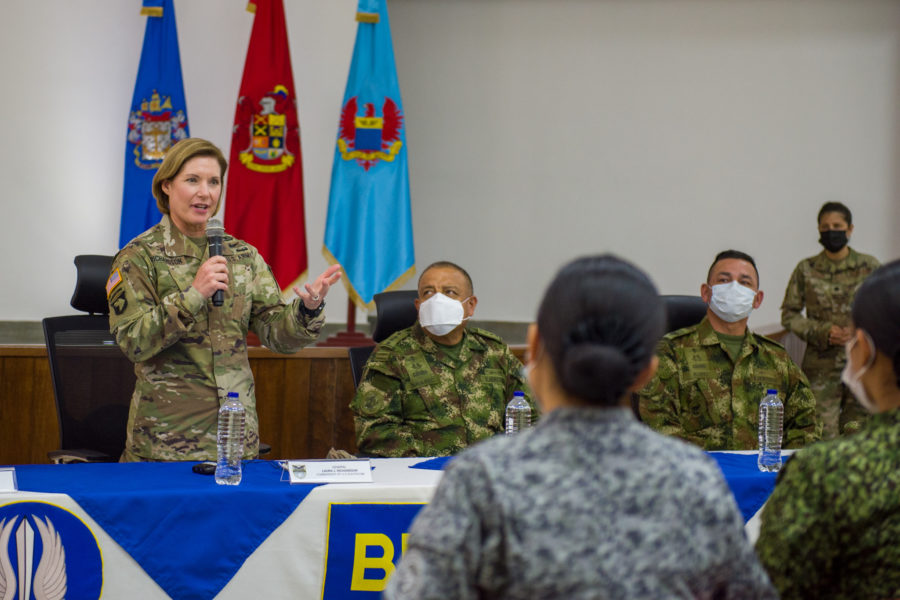U.S. SOUTHERN COMMAND, Miami, Fla.—Gen. Laura J. Richardson made history as the first woman to lead U.S. Southern Command and the third ever to lead a U.S. combatant command. Seeing a woman in such a senior leadership role is already having a powerful impact on female officers and enlisted personnel in regional militaries.
“Everywhere we went in Colombia, there were women lining up wanting to take pictures with her,” Lt. Col. Duilia Turner, gender officer and chief of SOUTHCOM’s Women’s Peace and Security (WPS) office, told Air Force Magazine on a recent visit to the Miami-based regional command for Latin America and the Caribbean.
“I think because she’s an aviator, when she saw another woman aviator … there was something there that they know what they went through, or they have been going through,” said Turner, who accompanied Richardson on her trip to Colombia Nov. 17-18. “There was the eyeball to eyeball connection that was really special to see.”
Over 70 women and men attended the event at the Tolemaida Air Base in the central Colombian Andes, home to American-made Blackhawk helicopters like those Richardson flew in Iraq and Afghanistan. Colombian leaders discussed opportunities for women in defense and security, training and education, and the development of the senior enlisted force.
“[Richardson] is interested in the force development, the development of the enlisted corps, junior officers,” said Turner. “As well as the idea that talent doesn’t have gender.”
SOUTHCOM’s Women’s Peace and Security office was established in 2020 under the civilian deputy to the commander, while other combatant commands host their WPS offices under directorates. As a priority program, SOUTHCOM’s office is the only one led by a military officer. WPS offices were set up in response to the 2017 Women, Peace, and Security Act signed by President Donald J. Trump that enshrined in law the U.S. commitment to UN Security Council resolution 1325.
Turner, who was born in New York to Colombian parents and raised in Brazil until the age of 19, is using her Air Force training and personal story to help advance Richardson’s progress on the initiative.
The gender officer explained that SOUTHCOM’s outreach related to UNSCR 1325 builds trust with partner militaries and helps the U.S. reinforce its commitment to shared democratic values.
“When we share those values of trust, democracy, equality under the law, we have this connection that can only help us to foster this in our region for stability,” Turner explained. “It’s a quiet weapon system, … and that’s a strategic advantage of women, peace, and security.”
Women comprise 32 percent of the Colombian Air Force compared to the U.S. Air Force at 21 percent. In Colombia, 11 percent of those female aviators are fixed and rotary wing pilots, a Colombian Air Force spokesperson told Air Force Magazine.
Across the region, SOUTHCOM’s WPS office has reached over 20 countries. During COVID, the command’s senior enlisted panels reached 40,000 viewers online and achieved 150,000 engagements.
The biggest challenge that remains, Turner said, is “mindset.”
“I am in the business of changing mindsets,” she said. “The mindset that thinks that women shouldn’t be in the military, that thinks that we’re inferior in any way, physically or mentally, that we don’t belong here, that this is not about combat capability.”
Turner uses education and data to show that women help fill strategic and operational “blind spots,” contributing to mission effectiveness by adding a valuable perspective.
“This is not making concessions for women so that, you know, we can lower the standard so women can hop in. The idea is to allow women who are capable to really flourish and make our force [better],” she said. “This is not wishful thinking, ‘Oh, let’s feel good about it.’ This is a fact.”
Turner saw that Richardson was moved by the impact she made at Tolemaida.
“Sometimes it takes someone on that level to make that inspirational impact to show, ‘Wow, you really can go super far,’” she said of the Colombian aviators and other female service members who were motivated by Richardson’s engagement and presence.
“I was not expecting that,” Turner added. “When I knew she was coming, I was very excited. But I think I’m pleasantly surprised with their reactions and what they can still do.”
